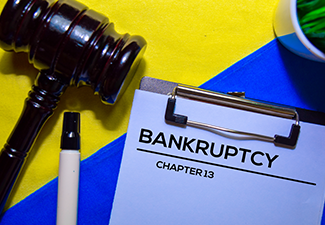What if I Can’t Fulfill the Repayment Plan Under Chapter 13?
Aug. 28, 2023
 Chapter 13 bankruptcy allows you to consolidate and restructure your debt and pay your creditors back on your own terms within three to five years. However, completing your repayment plan under Chapter 13 is not always easy. A debtor may fall behind on their Chapter 13 plan due to unforeseen circumstances and risk having their case dismissed for non-payment.
Chapter 13 bankruptcy allows you to consolidate and restructure your debt and pay your creditors back on your own terms within three to five years. However, completing your repayment plan under Chapter 13 is not always easy. A debtor may fall behind on their Chapter 13 plan due to unforeseen circumstances and risk having their case dismissed for non-payment.
If you are struggling with making payments under your Chapter 13 plan, our bankruptcy attorneys at Vivona Pandurangi, PLC can help explain the options available to you. We can help you get your debt back under your control and achieve stability in your life. With offices in Alexandria and Falls Church, Virginia, we also serve Fairfax, Manassas, Arlington, and the surrounding areas.
What Happens if You Miss a Payment Under the Chapter 13 Plan?
Missing a payment under your Chapter 13 plan can negatively impact your case. In the worst-case scenario, the court can decide to dismiss your case altogether or may choose to convert your case to Chapter 7, which means some of your assets may be sold to repay your outstanding debts.
However, if you make a Chapter 13 payment late by a few days due to unexpected financial difficulties, your case might not result in dismissal, though you do not want to take that risk. If you anticipate missing or making a late payment, you might want to consult with an attorney to discuss your options.
Options When You Can’t Fulfill Your Repayment Plan
When you experience a problem with making a payment under your Chapter 13 bankruptcy plan, there are several options to consider to ensure that you uphold your end of the payment plan and minimize possible negative consequences:
Defer a payment. A temporary financial emergency, such as an unexpected car accident resulting in medical expenses, is a common reason for missing or delaying a Chapter 13 payment. In this case, deferring a payment to get caught up within a reasonable amount of time (usually a month or two) may be a viable option.
Ask the court to modify the repayment plan. If you do not anticipate fulfilling the repayment plan under Chapter 13 in the foreseeable future due to the loss of your job or other financial struggles, you may need to consider asking the court to modify the current plan by proposing a new payment amount and showing proof that your circumstances have changed.
Request a hardship discharge. If you cannot continue making payments under your Chapter 13 plan, you might be eligible for a hardship discharge. Upon receiving your request for a hardship discharge, the court will assess your financial situation and determine whether the discharge is justified. However, you must be able to prove that the change in your circumstances was not your fault and that the condition is likely to persist and prevent you from completing the plan (e.g., a disability or a life-altering medical condition).
Convert to Chapter 7. If none of the above options are suitable or available for your circumstances, you might want to consider converting your bankruptcy from Chapter 13 to Chapter 7. However, keep in mind that (a) Chapter 7 bankruptcy means that the trustee will sell your non-exempt property to repay your creditors and (b) you will have to pass the means test to qualify for a discharge under Chapter 7.
Dismiss your bankruptcy case and then refile. Depending on your situation, you may also choose to dismiss your case and then refile another Chapter 13 bankruptcy. For some people, this may be the only available option if they can no longer afford to keep making Chapter 13 payments. When your financial situation improves, you can file for bankruptcy again.
Everyone’s situation is unique when it comes to having trouble keeping up with payments under Chapter 13. That is why you might want to consult with an experienced attorney to discuss your options and understand your best course of action.
Discover Your Options
If you have fallen behind on your Chapter 13 payments or anticipate having problems with fulfilling the repayment plan, you might want to speak with an attorney to discover your options. Our bankruptcy attorneys at Vivona Pandurangi, PLC can help you deal with this situation, no matter what you are going through. Reach out today and schedule a free consultation before the situation feels out of control.
